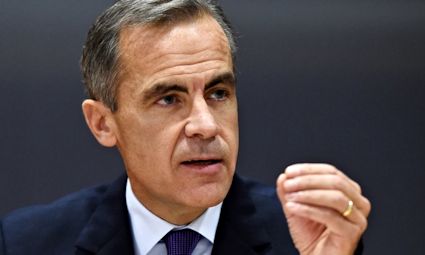|
Mark Carney says eurozone is caught in a debt trap and should ease
hardline budget cuts just days after the Syriza election directly
challenged policy
 |
| Bank of England Governor Mark Carney has attacked eurozone austerity. Photograph: Andy Rain/EPA |
The Bank of England
governor, Mark Carney, has launched a strong attack on austerity in the
eurozone as he warned that he single-currency area was caught in a debt
trap that could cost it a second lost decade.
Speaking in Dublin, Carney said the eurozone needed to ease its
hardline budgetary policies and make rapid progress towards a fiscal
union that would transfer resources from rich to poor countries.
“It is difficult to avoid the conclusion that, if the eurozone were a
country, fiscal policy would be substantially more supportive,” the
governor said. “However, it is tighter than in the UK, even though Europe still lacks other effective risk-sharing mechanisms and is relatively inflexible.”
Carney’s remarks come just three days after the election of the
Syriza-led government in Greece presented a direct challenge to the
austerity policies championed in the eurozone by Germany’s Angela
Merkel.
While not mentioning any eurozone country by name, Carney made it clear
that he thought the failure to complete the process of integration
coupled with over-restrictive fiscal policies risked driving the
18-nation single currency area deeper into a debt trap.
“Since the financial crisis all major advanced economies have been in
a debt trap where low growth deepens the burden of debt, prompting the
private sector to cut spending further. Persistent economic weakness
damages the extent to which economies can recover. Skills and capital
atrophy. Workers become discouraged and leave the labour force.
Prospects decline and the noose tightens.
“As difficult as it has been, some countries, including the US and
the UK, are now escaping this trap. Others in the euro area are sinking
deeper.”
Since the start of the eurozone crisis more than five years ago, Europe’s policy makers have been calling for the creation of a banking union
and a fiscal union to stand alongside the monetary union that created
the single currency. There have also been calls, from the European
commission, the European Central Bank and individual governments for
economic reforms to make the eurozone more competitive.
Carney noted: “As of this evening, progress on structural reforms in
the euro area remains uneven. Cross border risk sharing through the
financial system has slid backwards. Europe’s leaders do not currently
foresee fiscal union as part of monetary union. Such timidity has
costs.”
The governor added that there are four features of Britain’s economic
model that showed how to escape a debt trap: an integrated financial
system that channelled savings into investment; fiscal policy that moved
money around the UK and was flexible enough to allow budget deficits to
rise during downturns; the economy was open and flexible; and the
monetary policy operated by Threadneedle Street was credible.
He contrasted the UK with the eurozone, where output unadjusted for
inflation has increased by 5% in almost seven years and inflation
excluding fuel and food prices has been below 1% for over a year. “This
is potentially dangerous. Low nominal growth is intensifying the euro
area’s debt burden. The fear of stagnation is holding back spending and
investment.”
Carney has been vocal in his support for the European Central Bank’s
decision to start buying government and commercial debt in its own
version of the quantitative easing programmes, but said the
Frankfurt-based central bank was unable alone to eliminate the threat of
a prolonged stagnation. “These exist primarily because, in most
respects, the current construction of the euro area is unfinished.”
The governor expressed scepticism about whether improving
competitiveness through driving down costs – a process known as internal
devaluation – would work. “Internal devaluations simply reallocate
demand within the currency union. They do not boost aggregate demand in
the euro area as a whole. Put another way, since competitiveness is
relative, a solution for some cannot be a solution for all.”
Carney said the eurozone’s unemployment rate of 11.5% was more than
double that of the UK, but its fiscal deficit – the gap between tax
revenues and spending – was only half the size of the UK’s. The
eurozone, he said, should be using a “constructive” fiscal policy to
support demand and mitigate the “tail risks of stagnation”.
He added: “Europe needs a comprehensive, coherent plan to anchor expectations, build confidence and escape its debt trap.” Source: The Guardian
|

